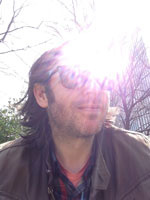
The University of Iowa School of Art and Art History in the College of Liberal Arts and Sciences will hold its biennial Grant Wood Symposium, “Revolt Against the City: Midwestern Culture in Hard Times,” Friday and Saturday, April 25 and 26 at Art Building West.
The symposium will feature talks by art history and American studies scholars on creativity and artistic production in the Midwest and the Regionalist art movement of the 1930s.
The school’s Grant Wood Art Colony Fellows, painter Eric Sall, printmaker Kristina Paabus, and choreographer Esther Baker-Tarpaga, will also exhibit and speak about their work. All events are free and open to the public.
Featured lectures and exhibits are highlighted below. All events take place in 240 Art Building West, unless otherwise noted. A full schedule can be found on the symposium website.
Schedule

Friday, April 25
- 3:30–5 p.m.: “SABOTAGE” Grant Wood Fellows’ Exhibition, Levitt Gallery, Art Building West. This exhibition will include work by Sall and Paabus, and two short performance pieces by Baker-Tarpaga.
- 7:30–9 p.m.: Symposium Keynote Address, “The Mid-Western Mind of Frank Lloyd Wright” by Anthony Alofsin (University of Texas, Austin), with a welcome by John Beldon Scott.
Saturday, April 26
- 9-9:15 a.m. Welcome by UI President Sally Mason
- 9:15–9:45 a.m.: “MoMA's Wood: Regionalism and the Midwest at the Heart of the Modernist Beast,” a lecture by UI grad student Dimitrios Latsis
- 9:45–10:15 a.m.: "Grant Wood's Midwest and the Politics of Regionalism in the 1920s and 30s,” a lecture by Michael Steiner (California State University, Fullerton)
- 10:45–11:45 a.m.: "Revolt in the City: Labor and Art in the Urban Midwest,” a lecture by Paula Wisotzki (Loyola University, Chicago)
- 11:15 a.m.–11:45 p.m.: “Federal Art in the Midwest in the 1930s and the Meeting of Rural and Urban Cultures: A Challenge to Grant Wood's ‘Revolt Against the City,’" a lecture by Gregory Gilbert (Knox College)
About the Fellows
The Grant Wood Art Colony was founded in 2010 as a place that nurtures creative work and teaching in disciplines relevant to the art and life of Iowa native Grant Wood. The fellowship program provides three one-year post-MFA or post-doctoral fellowships in painting, printmaking, and interdisciplinary performance. Fellows are selected through a national competition and provided with furnished living quarters and a private studio.
In exchange for a teaching salary, benefits, accommodations, and abundant time to work, the fellows teach two UI courses, present a public lecture about their work, exhibit their work, and participate in public outreach activities during the year. Then, says John Beldon Scott, director of the School of Art and Art History, “They go back out into the professional world energized by the time they’ve had here. Grant Wood’s legacy is contributing to the creative environment of the present moment. It’s truly a living legacy.”


Sall, 2014 Painting Fellow, is a native of South Dakota and holds a Master of Fine Arts from Virginia Commonwealth University. He’s working on a major public art piece for the Richard Bolling Federal Building in Kansas City. More info here.
Paabus, 2014 Printmaking Fellow, writes, “In my work I examine the distinctions of fact and fiction, and the murky areas that lie in between.” More info here.
Baker-Tarpaga, 2014 Interdisciplinary Performance Fellow, is leading a performance class with graduate students from dance, music, the Center for the Book, visual arts, and theatre arts. “I am interested in what is visible and what is invisible,” she writes, “what is representation, what is fantasy, what is autobiography.”
About the symposium
This year’s symposium, “Revolt Against the City,” takes its name from a 1935 essay co-authored by renowned painter and Iowa native Grant Wood. The essay—or manifesto, as it’s come to be known—outlines the basic principles of a new, “Regionalist” art that celebrated rural themes, ideas, and values.
“Wood was saying that you don’t need to go to New York to create art," says Scott. "There’s a lot of creativity in the small towns and rural environments of the Midwest—a lot of imagery, important subject matter, and major artists—painters, printmakers, writers, architects, and others.”
Noting that Wood published the essay during the Great Depression, Scott says, “Having just come through the ‘Great Recession,’ we thought this might be an interesting time to look back at the 1930s in the Midwest and see what form artistic production took outside of the cities, and discuss how Grant Wood’s work exemplified the creative environment in the Midwest then, and how it still does today.”
The event’s keynote address will explore the work of Frank Lloyd Wright, an Illinois-based contemporary of Wood, whose famous “Prairie Style” of architecture draws on Midwestern themes.
For more information and to make reservations for groups of more than 20, contact Saffron Henke, saffron-henke@uiowa.edu, assistant director for the Grant Wood Art Colony.
Individuals with disabilities are encouraged to attend all UI-sponsored events. If you are a person with a disability who requires a reasonable accommodation in order to participate in this program, contact the School of Art and Art History, 150 ABW, in advance at 319-335-1376.